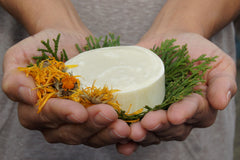The Importance of Natural Skincare and Non-Toxic Ingredients on the Body
Your skin, the largest organ of your body, is an incredible protective layer which is also sensitive, porous and breathable. These qualities enable your skin to help balance your body and remove toxins. So, it's crucial to be mindful of not only what you put in your fabulous "earth suit" but what you put ON it too.
Why Personal Care Products Matter
Of all the products in our homes, "personal care" products are important to examine because we use them daily, and they come into contact with our skin and lungs frequently.
Did you know that up to 60% of what you apply to your skin can be absorbed within seconds, entering your bloodstream and circulating through your body? For babies and children this absorption rate can be as high as 90%.
Many skin irritations, including itchiness, rashes, and even eczema, may be your body's adverse reaction to the multitude of chemicals and synthetic ingredients in commercial products. Awareness of these ingredients is essential, as their impact extends beyond personal health to the environment.

Setting a Healthy Example for Our Children
As parents, we play a crucial role in shaping our children's habits and choices, including their approach to skincare. By prioritizing products with non-toxic ingredients and educating them about reading labels and understanding ingredient lists, we empower them to make informed decisions from a young age.
Setting a good example goes beyond skincare—it extends to instilling values of health, sustainability, and critical thinking. When children see us prioritize products that are transparent about ingredients and committed to non-toxic formulations, they learn the importance of caring for themselves and the planet and won't be fooled by "greenwashing".
What is Greenwashing?
Greenwashing is a term used to describe misleading marketing tactics used by companies to make their products appear more environmentally friendly or healthier than they actually are. Unfortunately, this phenomenon is very prevalent in the skincare industry where brands capitalize on the growing consumer demand for natural and eco-conscious products.
An example of greenwashing in skincare is when a product claims to be "green" or "natural" based on a single botanical ingredient prominently displayed on the front label, while the rest of the formulation may still contain harmful chemicals or synthetic fragrances. This deceptive practice can lead consumers to believe they are making a healthier choice when, in reality, they may be exposing themselves to potentially harmful substances.

Daily Exposure Has a Cumulative Effect.
It's estimated that the average woman can put over 500 chemicals on her body each day through the cosmetics and body "care" products she uses. That fact alone is pretty scary, but the cumulative effect translates to around FIVE POUNDS of chemicals absorbed each year - through "beauty" products alone! Even more alarming, many of these ingredients have been found in cancer tumours and linked to immune dysfunction, hormone disruption and other health problems. According to some studies* Methylparaben, an ingredient found in many body care products, can react with UVB rays and cause DNA damage as well as increase the rate and appearance of aging. (*1, 2)
Where You Live Determines the Rules.
One might expect that companies or government bodies would ensure the products allowed on shelves are safe, but the reality is often quite different.
Regrettably the beauty and cosmetics industry is "self-regulated" with no mandatory testing required before products hit the market. In the U.S., the FDA has no authority to require testing of ingredients. Although Canada has slightly stricter regulations, you'll still find known carcinogens and hormone disruptors in many products deemed "safe for human use". In contrast, products sold in countries with stricter regulations, like the UK and France, are often free from these harmful chemicals.

What Ingredients Should You Look For In Skincare?
There's a better way, a healthier way to choose safe skincare products; it's so simple, AND you can start right now. The power is literally in YOUR hands. Take control over what goes on your body by simply looking at what you are putting on your body! Turn the product over, read the label and ask yourself, "Do I want this on my skin?"
Remember, your incredible "earth suit" absorbs what you put on it, so why not make sure you "Feed Your Skin" healthy ingredients. To make life easier, we created a convenient pocket list for you - it's wallet size so you can always have it handy when you're shopping. (Email jingo@neitrabb.com and we'll send you as many as you want to share with family and friends too!)
Neitra Body Botanicals: Simplifying Healthy Choices
At Neitra Body Botanicals, we understand the importance of transparency and trust in skincare products. Our commitment to using only non-toxic, plant-based ingredients ensures that every product we make is not only safe and effective but also aligned with our values of sustainability and ethical sourcing.
On top of that, we micro-batch all our products (no outsourcing here) which ensures you're always getting the freshest skincare possible too!
The Top Six Ingredients To Avoid - You'll NEVER Find Them In Neitra Products and Here's Why:
1). PARABENS (benzyl, butyl, propyl, methyl, ethyl, isobutyl): These chemicals are often used to prevent products from developing mould and fungus. (Usually in products that contain water - to learn more about why water should NOT be in your skincare, see our "Water, Water Everywhere" blog). Parabens are known endrocrine disruptors and have been found in breast cancer tumours. They're also suspected in causing testicular cancer in men as well as interfering with male reproductive functions. Remember, women aren't the only ones using skin care products - fellas need to be just as aware!
2). PTHALATES: This "family" of chemicals are mostly found in fragrances, perfumes and colognes. Pthalates are known hormone disruptors and are linked to reproductive and developmental issues in children as well as causing insulin resistance. Pthalates have also been linked to birth defects in male reproductive systems with some research linking to problems with the liver, kidneys, heart and lungs.
3). TRICLOSAN: Mainly used in deodorants, antiperspirants and hand sanitizers or anti-bacterial soaps, they're also found in laundry detergents, and cosmetics. According to the EPA, Triclosan is technically a pesticide and kills bacteria. But as you may know, some bacteria are NOT harmful to you so "killing them all" can actually have a negative effect on your health. Worst of all, Triclosan has been classified as bio-accumulative (meaning it does not biodegrade) and it builds up as it's washed down our drains making it harmful to our environment and toxic to aquatic life.
4). DEA - Dethanolamine (and DEA compounds): Used in many products including soaps, shampoos, moisturizers, cosmetics, cleansers, even sunscreen. It can be used to make products creamy or sudsy or to counteract the acidity (adjust the pH levels) of other ingredients in products. While DEA is known to cause skin and eye irritation, the EU has gone so far as to warn that prolonged exposure can cause serious damage to your health. (*3)
5). PEGs (ex. PEG-4, PEG-100) Polyethylene glycol (and compounds): Just to be clear here, PEG isn't a "single" ingredient but rather an entire "class" of them; the number that follows actually represents the units of ethylene glycol. And FYI, the lower the number the more easily absorbed it is. Derived from petroleum (yes, petroleum) PEG is a de-greaser and you'll also find it in oven degreasers - NOT KIDDING! - so no doubt it'll strip your skin of beneficial moisture. PEGs are also used to "carry" moisture in skin care products. (In cosmetics to make things creamy or as thickeners). PEG has also been "praised" to "enhance penetration" - meaning it increases the absorption of a product by your skin. But wait, you NOW know that means ingredients that could be harmful to you go even further into your system. And to top it off, there's growing evidence of geno-toxicity in PEG compounds especially related to them causing toxicity when used on broken skin.
6). SULFATES (Sodium Lauryl/Laureth Sulfate: SLS or SLES, Ammonium Lauryl/Laureth Sulfate: ALS or ALES): This is a BIG one because it's found in up to 90% of skin and hair care that foams or lathers. They are KNOWN skin irritants, endocrine and hormone disruptors and even suspected carcinogens. Some believe they can cause gene mutation - that's some serious stuff - especially when they are such a widespread ingredient!

Knowledge is power - Use it for good!
Unfortunately, you may find many of these chemicals in the skincare products you're using right now. That can feel scary, but don't let it overwhelm you. Empower yourself by making informed choices. Examine the products you use and eliminate those with harmful ingredients.
Remember, the power is in YOUR hands with what you choose to purchase and what you put on your body! We created Neitra to simplify your life and enhance your life. Simply put, we're here to help you make the switch to healthier skin care choices.
Neitra Harnesses the Power of Nature.
Neitra products contain only 100% pure vegetable and nut oils and butters and are scented using therapeutic grade essential oils. They never contain synthetic ingredients, preservatives, fragrances, or other known toxins. We follow ancient wisdom that has been used for centuries by civilizations worldwide to soothe problems, relieve irritation and support your body to naturally take care of and balance itself.
Remember, your body is an amazing thing and it likes to work for you especially when you work for it - now you'll be working together!
Share this knowledge with others who are seeking healthier alternatives. Together, we CAN make a difference!
In Neitra Love,
Piper & Jingo
References:
*1 O.H. et al (2006) Methylparaben potentiates UV-induced damage of skin keratinocytes, ScienceDirect, Toxicology, Volume 227, Issues 1-2, 3 pages 62-72
*2 Y.o. et al (2008) Combined Activation of Methyl Paraben by Light Irradiation and Esterase Metabolism toward Oxidative DNA Damage, Chem. Res. Toxicol., 21 (8), pp 1594-1599
*3 European Commission. Regulation (EC) 1272/2008 , Annex VI, Table 3.2. Sep http://reach-compliance.eu/english/legislation/docs/launchers/CLP/launch-CLP-2008-1272-EC-ANNEX-VI.html




